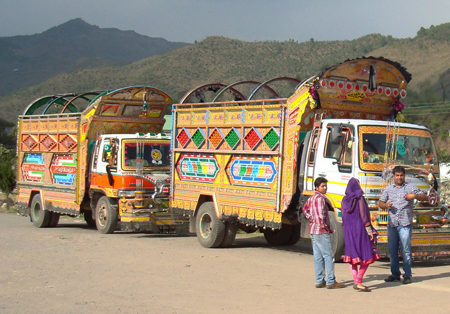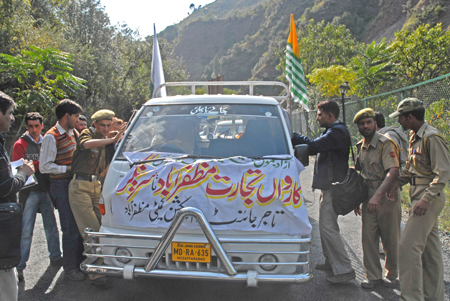Traders who barter select merchandise at two windows on the LoC since October 2008 have managed an overall turnover of Rs 1600 crore since 2008. For the first time, they interacted with India’s larger trade bodies flagging the concerns they earlier discussed with policy makers. A Kashmir Life report.

By all accounts, the limited opening of LoC is the only initiative of any consequence between India and Pakistan on the Kashmir front. The path breaking cross-LoC bus service bridged the gap of more than half a century in April 2005. The two countries hastened permitting trade via Uri (Kashmir) and Chakan da Bagh (Poonch) in October 2008 after tens of thousands of people marched towards the LoC in summer to reopen the Jhelum Valley Road (JVR) for basic supplies and exports in wake of protracted economic blockade by right-winger groups in Jammu.
This is precisely the main factor why every non-governmental organization (NGO) working on Kashmir was interested in “contributing” to this initiative. Routine “studies” and discussions on the initiative’s ‘problems and prospects’ apart, there were two NGOs that contributed towards the process. The US developmental NGO Mercy Corps and the UK based Conciliation Resources. The latter started first with a simple module of intervention. It arranged a series of interactions between the traders in third countries, did a bit of basic research and finally ended up holding an election for the joint trans-LoC chamber that the ‘stakeholders’ had loosely cobbled together in anticipation of trade in October 2008.
Mercy Corps joined the efforts later but had an extended and an apparently detailed capsule of intervention. It carried out a number of surveys about the state and status of the trade, focused on J&K side of the traders and helped them understand the issues within the fraternity and the trade. It carried out a series of programmes to help the traders improve their negotiating skills under its unLoCk project. The impressive contribution of this externally funded project is expected to be a website dedicated to the cross-LoC trade that will offer all the basic information about it including the market rates of the tradable item on the two sides of the divide. The site is expected to be interactive and will be handed over to the joint chamber once its testing is done. This will somehow help the two sides interact virtually because they lack telephone communication facilities and meeting opportunities.
The intervention from these two groups, at least for the last one year, had helped the stakeholders to benefit better and faster beyond the occasional foreign jaunts. But what has gone largely unnoticed is that there was a bit of competition between the two NGOs which eventually started neutralising their initial contributions. While CR is not doing much these days, the Mercy Corps is reportedly winding up its project by August. Some of the targets that these NGOs had set for themselves might not be achieved now.
But the gulf seems to have been filled in anticipation of its creation. Centre for Dialogue and Reconciliation (CDR), a Delhi based NGO run by Ms Sushobha Barve has already been working on Kashmir for a long time and has finally jumped into the trans-LoC trade. It had done some elementary studies on the trade but was restricted to the larger issues of dialogue and reconciliation.
Last week, CDR got all the stakeholders from both sides for a seminar to Srinagar. It included a dozen odd traders from the other side of the LoC. The exercise that state Industries Minister Surjit Singh Slathia formally threw open was to encourage the stakeholders to assess the socio-economic impact of the trade, debate the specific issues confronting them and explore its future in the wake of changing dynamics in the overall Indo-Pak trade.
Consequent discussions indicated the participants were reinventing the wheel. They talked about the same old problems that they have been witnessing for all these years including the lack of communication between the two trading partners, absence of interactions with each other, failure in not creating a dispute resolution set up and lack of banking. These issues have been discussed to a level that now everybody from Srinagar to Delhi and Islamabad is aware of the issues. Since the participants were the same who have been involved with the CBM since its inception, no impressive suggestion came to manage the crisis in the symbolic two-days-a-week barter.
However, what was different was the formal participation, for the first time since 2008, of the representatives from FICCI and the Wagha based Amritsar Exporters Chamber of Commerce. All these major trade bodies have remained outside the ambit of the trans-LoC trade formally and have been engaged in ‘fault finding’ in the trans-LoC trade for its own reasons. They made their viewpoints clear for the first time and offered the stakeholders their services and help.
In June 2009, a body of Wagha exporters sent a detailed communication to the Prime Minister Dr Manmohan Singh detailing how the traders from either side of the LoC were taking undue advantage of the ‘good will gesture’. They had listed a number of items that despite not being of ‘J&K origin’ were being bartered. The trade body said the barter led to foreign exchange losses, revenue losses, and demoralisation to the genuine importers and exporters. Till last week, all these activities were taking place under shadows and for the first time they shared the platform with the local stakeholders, thanks to CDR.
They made their positions very clear. This barter at LoC, Pradeep Sehgal of the FICCI said, should ideally supplement the regular trade that is happening through Wagha and Mumbai as any conflict will impact its sustainability.“If the barter intends to sustain and survive on policy benefit it will be difficult because subsidies and incentives are temporary, but if the stakeholders want an up-gradation on sustainable basis, we can approach the government together,” he said.
The zero-duty barter being a CBM has been crafted in such a way that it should not impact the larger market. Tradable items include handicrafts and commodities which are not taxed in either of the two markets and the barter has to be in J&K-origin items which should be consumed by a particular market on the other side. Of the 21 items, Sehgal said, eight items (garlic, ginger, green grams, coconut, ajwain, cardamom, dates, and kidney beans) have already been banned by the two sides because these started impacting the respective markets. Right now even almonds are being discussed for a possible ban despite the fact that they are grown on both sides of the LoC. “In the normal trade there are three taxes on either side of Wagha and in the proposed duty free trade two taxes shall still remain,” Sehgal said. “That is precisely why no government is permitting its revenue stream to get blocked and that rule would apply (in future) to trans-LoC trade as well.” Sehgal said the barter is highly fragile and delicate and has problems within and its scope and a framework will have to be decided by India and Pakistan.

“It (trans-LoC) is a non-market exchange of goods but if you want to monetise it, tariffs will come and it will become formal trade,” Sehgal said. “If the goods exchange impacts the revenue stream of any country, tariffs will automatically be invoked.”
Traders admitted they have done away with the local origin condition. Zulfiqar Abasi revealed his experience from the green gram (the moong daal) that dominated the import scene into J&K nearly for two years. “As we purchased all the categories of green gram in Pakistan, the rates jumped from Rs 15 a kilogram to Rs 140 and it was out of an average Pakistani’s purchasing capacity,” Abasi said. “Then we purchased whatever Afghanistan had and once we drained it totally we started looking at China and we were in the middle of purchase that it was banned.” He said same thing happened with coconut because Sri Lanka objected to the duty-free coconut imports from LoC that were selling at almost half the price that Pakistan was importing at from Colombo.
Pakistan, Abasi said, does not want the trans-LoC trade compromising its economy the same way Afghanistan did. “We are trading between Karachi and Peshawar and so far Pakistan has lost 33000 containers,” he said. “This trade has to be sustained without compromising the national interests of the two countries.”
Rajdeep Singh Uppal of Amritsar Exporters Chamber of Commerce was clearer on the issues. Bluntly admitting that a number of exporters in Delhi and Amritsar are “part of the trans-LoC trade” (they function through their local proxies who act as their agents) and want it to grow, Uppal said it could become problematic as the trader supposed to get engaged in intra-Kashmir trade is confusing it with India Pakistan trade. They want to use the same zero duty regime to service the larger markets in Indian and Pakistan but that will impact the established trading structure.” He suggested two options to the trans-LoC traders – either to upgrade the barter and make it regular trade between India and Pakistan or restrict it to its mandate – exchange local-origin goods within the market that erstwhile J&K boundaries offer. “You have permission to 21 items and not every item But the stakeholders on either side of the LoC are not in a mood to accept what the big brothers in Wagha and Lahore or the governments in Delhi and Islamabad are saying. “We see the trans-LoC trade as the base for a free economic zone within the territory that existed in the erstwhile state of J&K,” president Dr Mubin Shah said. “We ultimately want transit trade and till then if the goods traded through LoC enter tariff areas of India and Pakistan, they should take care of it.” His predecessor Abasi talked about the historic ignorance that the two countries exhibited towards the two halves of erstwhile Kashmir. “Do we see the same infrastructure in the Indian and Pakistani Punjab that exist in Muzaffrabad and Srinagar?” he asked. “They will have to offer the concessions to mend the growth gap.”
Even Jammu was on the same page. “This barter is not even one percent of the overall volume of trade between India and Pakistan so you need not to worry,” said industrialist Anil Suri. “Our manufacturing costs eight percent more than the Indian plains because of the locational disadvantage we have in J&K so incentivising the region is not bad.”
Y V Sharma, who heads the Jammu Chamber of Commerce suggested the larger trade bodies not to get upset over the trans-LoC trade because it is a CBM and not business. “It is less business and more emotion because this nominal trade is helping us to reunite somehow,” he said. “It is aimed at a larger target to increase the confidence to the level that Kashmir dispute is solved because the idea is to produce the trust and not the wealth.” Sharma said J&K is not interested in international trade and is keen to have a negative list in the trans-LoC trade.
A Srinagar based industrialist had tried to be innovative. Iqbal Tramboo suggested that the trans-LoC trade should manage the supply and demand in the entire market that the erstwhile J&K state offered. It would comprise Kashmir, Ladakh, Jammu, Mirpur, Muzaffarabad, Gilgit and Baltistan. “Let us import whatever is available on the other side and export whatever we have in the local market regardless of the place of origin with a limitation that it should be consumed within the designated territory,” Tramboo said. “That will be a good start.”
Estimations suggest that it is a market of around Rs 55000 crore with more than 17 million population. But Dr Shah who heads the trans-LoC joint chamber was dismissive of the idea of converting the erstwhile J&K state into a single market. “The geography of the state has all along remained a locational disadvantage,” Dr Shah said. “Why not use it to the advantage of the place and the two markets in the neighbourhood?”
Meanwhile, the J&K government has suggested inclusion of 27 more item to the 21 category barter basket that has a cumulative turnover of Rs 1600 crore so far. The suggestion has come in anticipation of the India Pakistan Joint Working Group meeting later next month.















